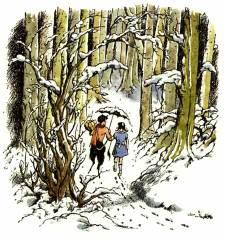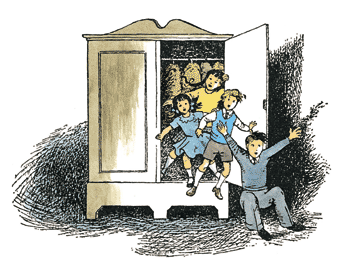Golden Compasses and Wooden Wardrobes: A critical look at the fantasy fiction of ultra-humanist Philip Pullman, and CS
Lewis.
(part 2)
Click here for part one, or scroll down to the previous post. (cont.)
Let me be momentarily gracious. Philip Pullman is not a bad writer. Among other things, he has a marvelously tactile touch with places and things, rendering his worlds in strong, evocative strokes of beauty and texture. He's just not a particularly great writer. Though aesthetically capable, he is cursed with a heavy, thudding touch. His philosophizing is graceless and hamfisted. And perhaps most to his detriment, he writes children like someone who's studied them in textbooks, but could never be bothered to speak to one and find out what they're like.
His heroine Lyra is a rigidly contained and unconvincing creation; created not to learn or discover or act freely, but solely to function in service of an omnipotent theme. As starkly serviceable and inorganic as anyone out of an Ayn Rand novel. This isn't a child; it's how Pullman imagines children ought to be. Or perhaps more likely, how he imagines himself as one.
The story impresses with sweeping arctic locales and visceral action. But reading them, one can't escape the notion that he's far more interested in ideological pamphleteering than natural storytelling or genuine characters. His characters are written with a marked lack of trust in them to reveal thematic truths through their own actions. Like everything else in his world, they're simply 'forced'. The seams show, and the writer appears, gnashing through the pages. Pullman reads like a man so rabidly chomping at the bit to air his grievances with society, religion, men of the cloth, etc... that he's all too willing to hang his material on unsatisfactory, and even lazy or contrived characterizations and plot turns, and attempt to compensate with exotic locales and big ideas. Sort of a 'we'll fix it in post' mentality.
Ironically enough, Lewis' application of christian themes in his writing was both far more explicit, and far more organic and disciplined. First and foremost, he set out to tell exciting and magical stories, and he did. The themes and morals were incidental, springing naturally from the work. Lewis goes into the process at depth in his essays on the matter, asserting emphatically that beginning with allegorical function in mind when starting a story, is a recipe for disaster. Rather, that the inspiration from Narnia came from his expanding on a single captivating image; a faun holding an umbrella.

Pullman lacks the discipline or perhaps ability, and the necessary trust in his audience to work that way. And in so doing, succumbs to the quintessential trappings of the desperate preacher and second-rate storyteller. Thus, though he fancies himself on equal footing, thinking he has succesfully emulated Lewis's 'formula' for a sort of 'fantasy evangelism', the fact is, he has the process completely backwards. Pullman is not interested in stories, he's interested in preaching. He's interested in essays and speechifying. He's a man with a mission, writing with a staunch 'theme first, story second' method.
Lewis simply enjoyed himself, writing exciting stories that read with the breezy, unstrained quality of a confident, sure-handed wordsmith. Confident in his skill, his faith, his scholarship, and with no so juvenile intent as to need to prove anything to anyone. Pullman's work gnashes and broods like a sulking teenager; seeking not it's own identity or purpose, but to define itself with an anti-identity and the histrionics of rebellion for it's own sake. In the end, it offers little to the reader's soul but an enfeebled, and pointless cry of 'Oh yeah?' Which is why fifty years from now, His Dark Materials will be relegated to dusty library shelves, replaced by the latest fashionable softcover iteration of pop-humanism for kids, and our children will still be eagerly sprinting through the wardrobe. And it is chiefly why Lewis is a first-rate writer, and Pullman is not.

-Nick
Technorati Tags
CS Lewis Philip Pullman Narnia The Golden Compass humanist humanism His Dark Materials His Dark Materials Movie
Nicole Kidman Daniel Craig Dan Brown Da Vinci Code Pullman fantasy novel politics religion christian christianity
film cinema movie movies thoughts reviews entertainment comedy humor culture Media art
literature Lyra
Lewis.
(part 2)
Click here for part one, or scroll down to the previous post. (cont.)
Let me be momentarily gracious. Philip Pullman is not a bad writer. Among other things, he has a marvelously tactile touch with places and things, rendering his worlds in strong, evocative strokes of beauty and texture. He's just not a particularly great writer. Though aesthetically capable, he is cursed with a heavy, thudding touch. His philosophizing is graceless and hamfisted. And perhaps most to his detriment, he writes children like someone who's studied them in textbooks, but could never be bothered to speak to one and find out what they're like.
His heroine Lyra is a rigidly contained and unconvincing creation; created not to learn or discover or act freely, but solely to function in service of an omnipotent theme. As starkly serviceable and inorganic as anyone out of an Ayn Rand novel. This isn't a child; it's how Pullman imagines children ought to be. Or perhaps more likely, how he imagines himself as one.
The story impresses with sweeping arctic locales and visceral action. But reading them, one can't escape the notion that he's far more interested in ideological pamphleteering than natural storytelling or genuine characters. His characters are written with a marked lack of trust in them to reveal thematic truths through their own actions. Like everything else in his world, they're simply 'forced'. The seams show, and the writer appears, gnashing through the pages. Pullman reads like a man so rabidly chomping at the bit to air his grievances with society, religion, men of the cloth, etc... that he's all too willing to hang his material on unsatisfactory, and even lazy or contrived characterizations and plot turns, and attempt to compensate with exotic locales and big ideas. Sort of a 'we'll fix it in post' mentality.
Ironically enough, Lewis' application of christian themes in his writing was both far more explicit, and far more organic and disciplined. First and foremost, he set out to tell exciting and magical stories, and he did. The themes and morals were incidental, springing naturally from the work. Lewis goes into the process at depth in his essays on the matter, asserting emphatically that beginning with allegorical function in mind when starting a story, is a recipe for disaster. Rather, that the inspiration from Narnia came from his expanding on a single captivating image; a faun holding an umbrella.

Pullman lacks the discipline or perhaps ability, and the necessary trust in his audience to work that way. And in so doing, succumbs to the quintessential trappings of the desperate preacher and second-rate storyteller. Thus, though he fancies himself on equal footing, thinking he has succesfully emulated Lewis's 'formula' for a sort of 'fantasy evangelism', the fact is, he has the process completely backwards. Pullman is not interested in stories, he's interested in preaching. He's interested in essays and speechifying. He's a man with a mission, writing with a staunch 'theme first, story second' method.
Lewis simply enjoyed himself, writing exciting stories that read with the breezy, unstrained quality of a confident, sure-handed wordsmith. Confident in his skill, his faith, his scholarship, and with no so juvenile intent as to need to prove anything to anyone. Pullman's work gnashes and broods like a sulking teenager; seeking not it's own identity or purpose, but to define itself with an anti-identity and the histrionics of rebellion for it's own sake. In the end, it offers little to the reader's soul but an enfeebled, and pointless cry of 'Oh yeah?' Which is why fifty years from now, His Dark Materials will be relegated to dusty library shelves, replaced by the latest fashionable softcover iteration of pop-humanism for kids, and our children will still be eagerly sprinting through the wardrobe. And it is chiefly why Lewis is a first-rate writer, and Pullman is not.

-Nick
Technorati Tags
CS Lewis Philip Pullman Narnia The Golden Compass humanist humanism His Dark Materials His Dark Materials Movie
Nicole Kidman Daniel Craig Dan Brown Da Vinci Code Pullman fantasy novel politics religion christian christianity
film cinema movie movies thoughts reviews entertainment comedy humor culture Media art
literature Lyra


0 Comments:
Post a Comment
<< Home